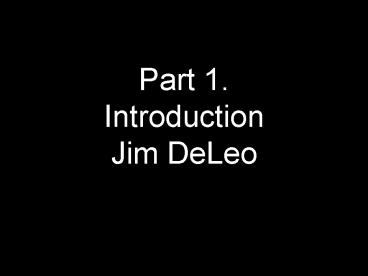Part 1. Introduction Jim DeLeo PowerPoint PPT Presentation
1 / 14
Title: Part 1. Introduction Jim DeLeo
1
Part 1.IntroductionJim DeLeo
2
In a nutshell
- This book is about constructivism a philosophy
that says we dont discover reality, but rather
we invent it. - We can not know what the real world is we can
only know what the real world is not. - Noncontingent reward experiments - a big theme
here. - Constructivism is incompatible with traditional
thinking which says reality exists and we can
discover it. - Constructivism says some of our ideas about
reality match reality better than others. - Many keys can unlock the same lock without
- knowing the lock.
- How such individual realities are constructed is
also discussed in this book.
3
Noncontingent Reward Experiments
- No connection between subjects performance and
the response of the experimenter. - Medical student experiment.
- Random number pairs - do they fit?
- Some subjects are convinced there is an order
that the experimenter is not aware of. - The subject has invented a reality that he
assumes he has discovered.
4
diseased
5
healthy
6
Noncontingent Reward Experiments
- No connection between subjects performance and
the response of the experimenter. - Medical student experiment.
- Random number pairs - do they fit?
- Some subjects are convinced there is an order
that the experimenter is not aware of. - The subject has invented a reality that he
assumes he has discovered.
7
We can not know what the real world is we can
only know what the real world is not.
8
Best
9
(No Transcript)
10
Failure shows the true passage was not discovered.
11
Success does not show the real (correct/true/best)
passage was discovered.
Failure shows the true passage was not discovered.
12
When I first saw this thing I thought it was a
cartoon map of Jims colon.
13
We can not know what the real world is we can
only know what the real world is not.
14
Part 1.
- 1. Introduction to Radical Constructivism
- Written by Ernst von Glasersfeld
- Reviewed by Jerry McLaughlin
- All we can ever know about the real world is
what it is not. - The above idea permeates the book.
- 2. On Constructing a Reality"
- Written by Heinz von Foerster
- Reviewed by Carl Leonard
- The environment as we perceive it is an
invention based on - neurophysiological mechanisms and the
ethical and aesthetic - implications of these constructs.
- This sounds like solipsism but we will see that
it is not.

